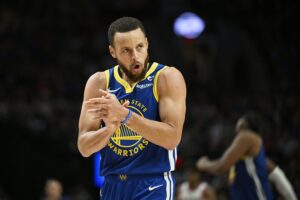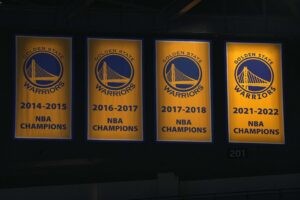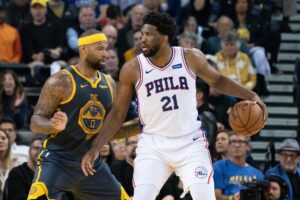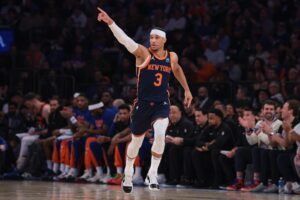Taking a look at a 2020 NBA mock draft, it’s strange to see that there’s a stunning lack of freshman talent in the NCAA right now, with injuries, suspensions, and overseas play leaving behind a class that will likely go down as one of the weakest in recent memory.
Even as we approach the halfway mark of the NBA season, the upcoming NBA draft is still a big unknown, as there still isn’t a consensus number one pick. That said, there is still ample upperclassmen talent, and NBA teams will still have their pick among potentially franchise-altering players.
The mock draft order was based on the standings heading into Saturday, Jan. 4.
2020 NBA Mock Draft
1. Atlanta Hawks: James Wiseman (Memphis, C, Freshman)
The Atlanta Hawks desperately need a big man, as evident by trade rumors linking them to center Andre Drummond. They’ve been shoring up on forward depth in recent drafts, such as John Collins, De’Andre Hunter, Cam Reddish, and Kevin Huerter, and they have an elite floor general in presumptive All-Star Trae Young. However, the lack of depth at center is lowering the Hawks’ ceiling.
They’ve recently been starting rookie second-rounder Bruno Fernando, who is only averaging 3.8 points and 3.1 rebounds per game. Consequently, the Hawks as a team are averaging 42.3 rebounds a game, third-worst in the league, and they’re giving up 53.4 points in the paint, easily the worst in the league. Adding James Wiseman would go a long way towards improving the Hawk’s abysmal defense while also providing Trae Young with easy assists.
Wiseman is by no means a consensus number one pick, especially with his short, controversy-ridden stint at Memphis, but he is still a pro-ready prospect with a high floor. His athletic abilities and shot-blocking prowess make him the best pick for the Hawks at number one.
2. Golden State Warriors: Anthony Edwards (Georgia, G, Freshman)
While they may already have an able shooting guard in Klay Thompson, the Golden State Warriors would be wise to go with the player many see as having the highest potential of this class. Anthony Edwards would not be a liability to the team’s chemistry given his long-distance abilities, and his athleticism and defensive tools would instantly improve the Warrior’s horrific defense.
In addition, the remaining players in the top echelon of this draft class would not fit well on the team. The Warriors already have Stephen Curry as their primary ball-handler, and with their timetable, they can’t afford to wait on some of the other point guards in this class.
Not only would Edwards be a good fit for the Warriors, but he also has legitimate superstar talent. As an athletic, versatile, and accurate 6’5 guard, Edwards could play as a three-and-D wing, a skill-set that NBA teams crave. His similarities to Klay Thompson only make him more valuable, and such a potential abundance of wing depth could propel the Warriors back to championship levels.
3. New York Knicks: LaMelo Ball (Illawarra Hawks, G, 2001)
With the exception of RJ Barrett and Mitchell Robinson, the New York Knicks have mainly drafted underperforming, inefficient players that are liabilities on the court. They’ve failed to adequately develop young talent, and consequently have a variety of holes to fill on their roster. While he definitely won’t solve all their problems, LaMelo Ball is certainly a good start. Ball’s athleticism is impressive, he has great defensive instincts, and he possesses elite passing abilities. In fact, he’s perhaps the best passer to enter the NBA Draft since his older brother Lonzo Ball did in 2017.
LaMelo Ball would also be a good fit off the court. Ever since his freshman year of high school, he’s been reported on extensively. He’s overcome criticism about his immaturity throughout his numerous exploits on three different continents. Unlike other arriving players, the Knicks shouldn’t have to worry about how Ball will react to the media capital of the world.
4. Cleveland Cavaliers: Cole Anthony (North Carolina, G, Freshman)
At this point in the draft, the Cleveland Cavaliers should just take the best player available. While drafting three consecutive guards in the lottery may not be the best look for a rebuilding team, Cole Anthony provides boom-or-bust talent that exceeds that of nearly any other available prospect. He may fit in more naturally with the team than it seems.
The Collin Sexton and Darius Garland pairing was never truly going to work, as neither of those young guards plays good defense. In contrast, Anthony would be a better defensive fit with his underrated rebounding ability and some highlight-reel blocks. His defensive abilities have been demonstrated at North Carolina, where Anthony has had three games with double-digit rebounds, averaging 6.3 rebounds overall. Given his long term potential and willingness to play defense, the Cavaliers would be wise to draft Cole Anthony and pull the plug on the Sexton-Garland experiment.
5. Washington Wizards: Onyeka Okongwu (USC, C, Freshman)
By the start of the 2020-2021 season, the Washington Wizards should finally be at full strength, with John Wall returning as the floor general after nearly two seasons of inactivity. He’ll return to a team currently dead last in defensive rating. To help ease Wall’s transition back to the NBA, it is imperative that the Wizards add elite defenders who can also help reduce Wall’s scoring burden. For these reasons, Onyeka Okongwu would be the best pick at this stage of the draft. Originally starring with LaMelo Ball at Chino Hills High School, Okongwu has shot up draft boards in recent weeks. He’s an adept rim protector with a high motor, blocking shots at an exorbitant rate. Additionally, he’s uber-efficient and smooth in the post.
While Okongwu may not have the superstar ceiling of most top five picks, he’s still an intriguing talent who could make a real impact on both ends of the court. He can transform the Wizards’ lackluster defense while making easy baskets on offense. With this pick, the Wizards would add a difference-maker who could revamp their team for years to come.
6. New Orleans Pelicans: RJ Hampton (New Zealand Breakers, G, 2001)
For a team in the lottery, the New Orleans Pelicans surprisingly don’t have that many holes to fix. They have two handy facilitators in Lonzo Ball and Jrue Holiday, and they have two future superstar forwards in Brandon Ingram and Zion Williamson. One of their holes, however, is at shooting guard, which is why the team should pick RJ Hampton.
Hampton isn’t very flashy, and he is more likely to end up as a role player than as an All-Star. Regardless, he’s athletic with a high defensive IQ, and that’s exactly what the Pelicans need. Too many times this season, the Pelicans have engaged in shoot-outs with their opponents. Hampton should prevent this pattern from extending into the coming years. In addition, Hampton’s underrated passing ability could serve useful should the Pelicans trade either Holiday or Ball.
7. Detroit Pistons: Tyrese Maxey (Kentucky, G, Freshman)
With their dysfunctional backcourt, the Detroit Pistons should draft combo guard Tyrese Maxey. Maxey would fill a wide range of needs for the Pistons. First, he’s a solid passer who can distribute it around the court. He’d instantly slide in as the Pistons’ top floor general.
Next, while inconsistent, Maxey is an athletic scorer who can slash and attack the rim. If he rediscovers the stroke that aided him in high school and at the beginning of the college basketball season, he could also help alleviate the Piston’s outside shooting woes. Should Maxey become more efficient as a shooter, especially with his jump shot, he could push the Pistons into playoff contention. Ultimately, he’s a risk the Pistons should be willing to take.
8. Chicago Bulls: Jaden McDaniels (Washington, F, Freshman)
While the Chicago Bulls‘ backcourt of the future is set with Zach LaVine and Coby White, they need serviceable wings that can speed up the rebuild in Chicago. For this reason, the Bulls should pick Jaden McDaniels. One of the biggest reasons that this season hasn’t been as smooth as expected is the incompetence of the Bulls’ offense. Even though the team ranks fifth overall in defensive rating, it ranks among the bottom three in offensive rating.
McDaniels should help improve the Bulls’ uninspiring offense while sustaining its defensive productiveness. On offense, McDaniels has a scorer’s mentality, and he can bring it from long range, as evidenced by his 37.3 percent average on threes. Additionally, he effectively creates his own shot, especially on step backs. His athleticism allows him to run the floor, while also giving him room for success on the defensive end.
9. Sacramento Kings: Deni Avdija (Maccabi Tel Aviv, F, 2001)
For a team with playoff aspirations at the beginning of the season, the Sacramento Kings have been a failure. Part of the problem has been free throws and turnovers. The Kings rank 27th in “percentage of points from free throws”, and they rank 25th in assists to turnovers and turnover percentage.
If drafted, Deni Avdija would help solve these problems. His passing ability is elite, as is his shooting, albeit in limited minutes. These traits could allow him to star as the Kings’ secondary playmaker behind De’Aaron Fox. The Israeli forward also projects as a valuable defender, especially since he can defend multiple positions. If his smooth shot translates to the NBA, Avdija could project as a viable three-and-D wing. His time in the EuroLeague has made him more NBA-ready than many of the forward prospects in this draft, and his all-around abilities make him a solid choice for the Kings.
10. Minnesota Timberwolves: Nico Mannion (Arizona, G, Freshman)
After starting the season strong, the Minnesota Timberwolves have sputtered, and Karl-Anthony Towns has understandably become frustrated with the direction of the franchise. With Minnesota’s lack of quality playmakers, Towns has had to take a larger offensive burden. Drafting Nico Mannion should help ease tensions in Minnesota.
Mannion is a pass-first guard that has an incredible feel for the game. While he is not the most athletic, he has exhibited scoring potential, something incredibly important for a team that shoots cold from deep. Mannion may not have the highest ceiling, and he’ll probably struggle on defense due to his lack of athleticism, but he is a gifted passer who should bring the Timberwolves back to the playoffs. He should feed Andrew Wiggins and Towns, as well as aid in the development of Jarrett Culver and Josh Okogie.
11. Boston Celtics (from Memphis Grizzlies): Tyrese Haliburton (Iowa State, G, Sophomore)
As a potential Finals contender, the Boston Celtics are looking more for seasoned players who can contribute right away than a raw freshman. Given their lack of backup guard depth besides Marcus Smart, the addition of Tyrese Haliburton could prove useful down the line.
Haliburton is an all-around guard who can help out in a variety of areas. He’s shooting 52.6 percent from the field and a whopping 42.5 percent from three. He’s a great scorer off the dribble, rarely turns the ball over, and can play either guard spot.
Defensively, Haliburton is a mismatch, as he stands 6’7”, well over the height of most guards. He averages 2.6 steals per game, and he’s a great athlete, so he’ll be more than serviceable as a defender. Overall, Haliburton will come in with the ability to contribute from day one, making him the best fit for the Celtics at this spot.
12. Phoenix Suns: Aaron Nesmith (Vanderbilt, F, Sophomore)
Though they surprised many at the beginning of the season, the Phoenix Suns have since fallen off trajectory for a playoff spot. While they have two dynamic scorers in Devin Booker and Kelly Oubre, as well as an excellent point guard in Ricky Rubio, the Suns lack a wing that can relieve defensive pressure off Booker while also contributing to their up-and-coming defense.
Aaron Nesmith can fill both of these needs, as he embodies the aforementioned three-and-D archetype that is craved in today’s NBA. He’s shooting a sizzling 53 percent from downtown on eight attempts per game, as well as 51.3 percent from the field. He excels in catch-and-shoot situations, so he should feast on opportunities from Rubio. Additionally, Nesmith is an NBA-ready defender, averaging 3.9 defensive rebounds, 1.3 steals, and 0.8 blocks per game. Given Nesmith’s ascending draft stock, the Suns should pounce on the must-needed wing.
13. San Antonio Spurs: Isaiah Stewart (Washington, C, Freshman)
One of the biggest needs on this San Antonio Spurs team is rim protection. The team plays poorly in transition, and they need a big man who can clog up the paint.
Isaiah Stewart presents the kind of high floor center who fits well into the Spurs’ plans. He can contribute right away, which is important given the team’s preference to stay in the playoff hunt rather than reboot. He has a great defensive motor and is adept at blocking shots and grabbing rebounds. Stewart is also gifted with his frame, so he can bully opponents in the glass. With his defensive prowess and reluctance to shoot the three, Stewart would fit right in with the Spurs.
14. Charlotte Hornets: Obi Toppin (Dayton, F, Sophomore)
Since Kemba Walker left the Charlotte Hornets, the team has dropped off in all major offensive categories, and they’ve continued to exhibit the same lethargic pace that cost them a playoff spot last year. The team’s current record isn’t even indicative of how poor they have played, as their defensive rating ranks 27th in the league, while their offense sits at 23rd. They have two developing guards in Terry Rozier and Devonte’ Graham but haven’t put pieces around them to succeed. Thus, the Hornets should take a step in the right direction and pick Obi Toppin in this mock draft.
While it may be questionable to draft three consecutive wings, the Hornets should pounce on the best player available, and one who could vastly improve their offense and defense. They may be tempted to draft a center here, but Toppin will be more beneficial for the growth of the Hornets’ youth.
On the offensive end, the fundamentally sound Toppin can shoot well from deep, shooting 42.4 percent from three. He could space the floor for the Hornets, and provide easy assist opportunities for both the Hornet’s young guards. His presence should also help improve the team’s league-worst pace. Defensively, Toppin isn’t elite, but he still has the size, versatility, and strength to effectively guard forwards. The potential impact he could have on the team trumps that of any other available prospect.
Main Photo
Embed from Getty Images






